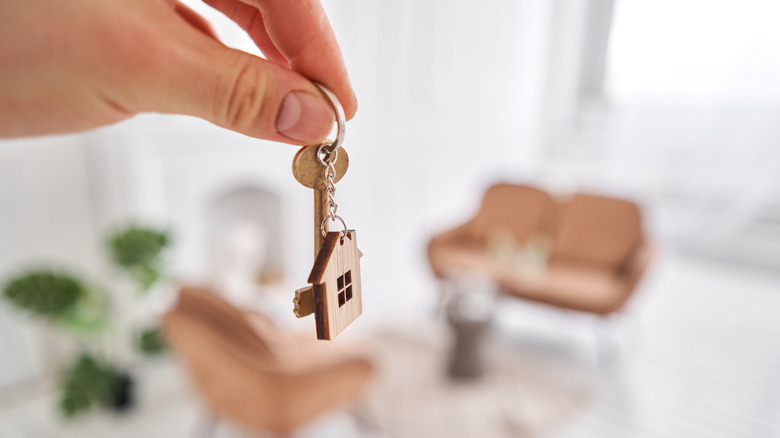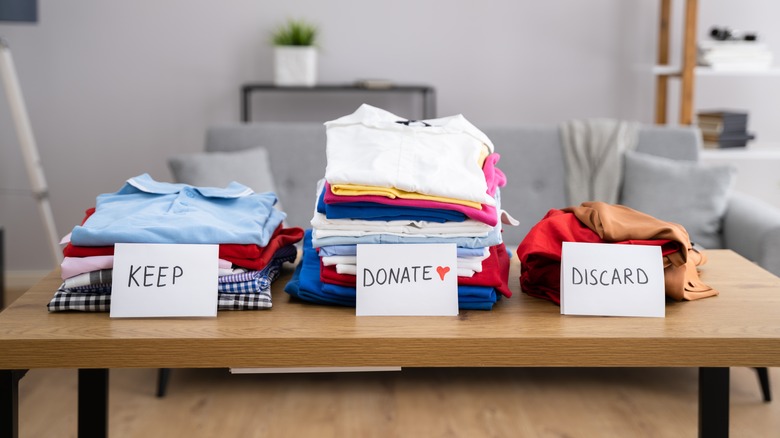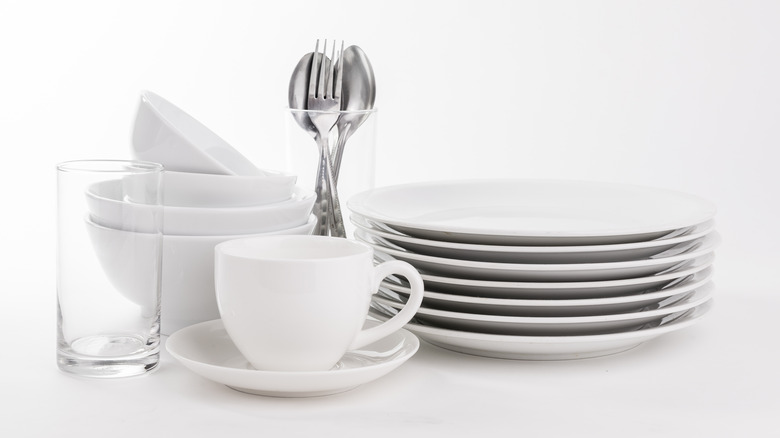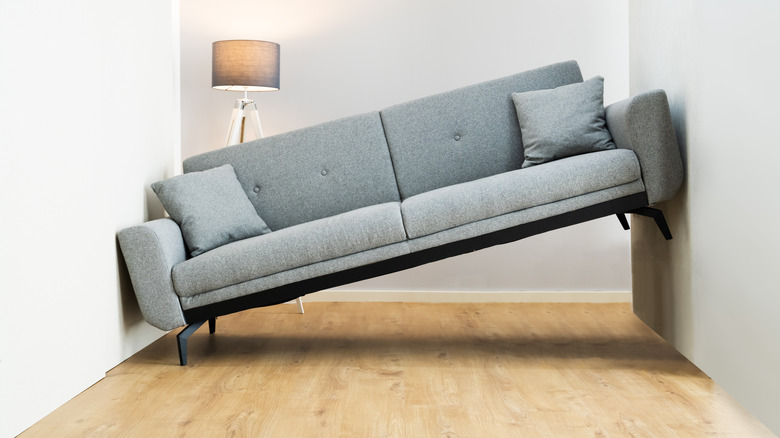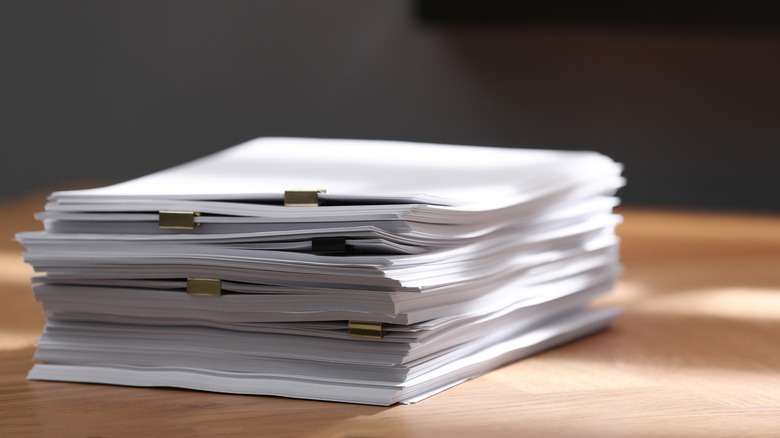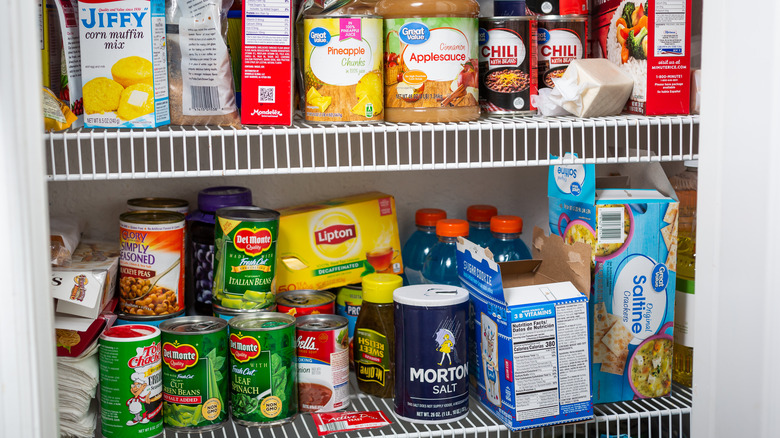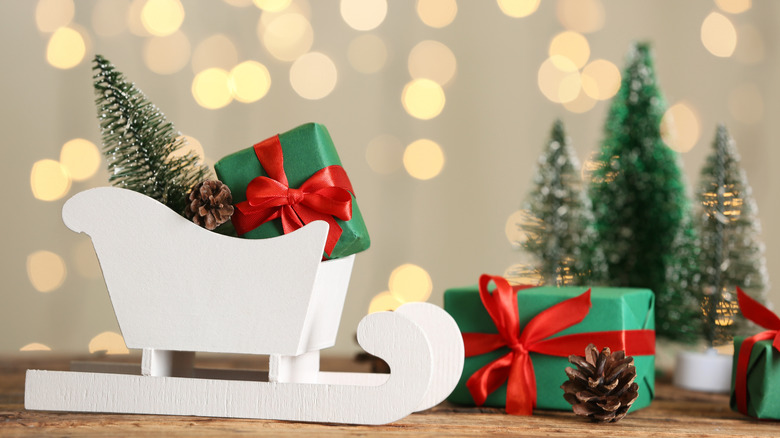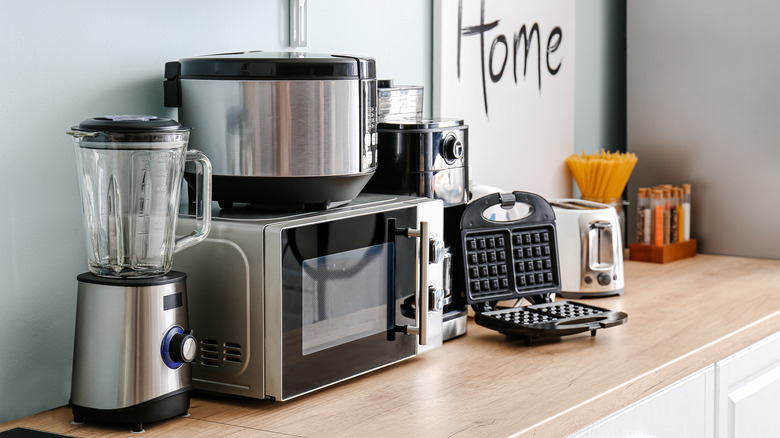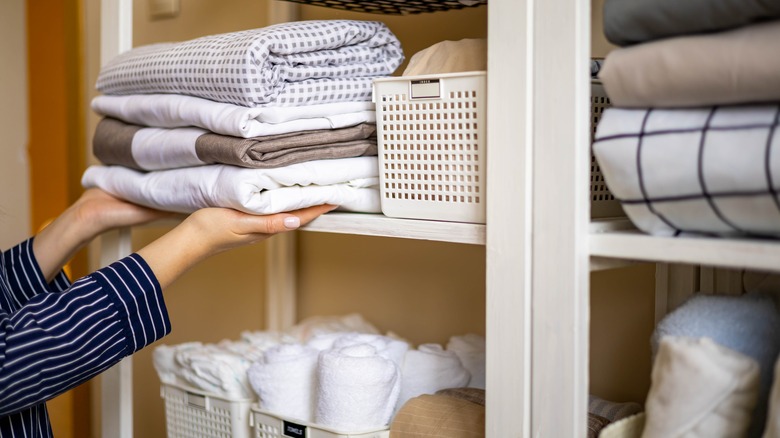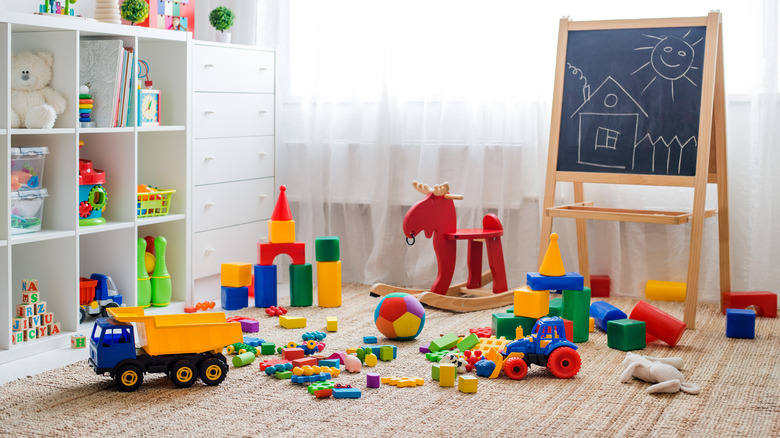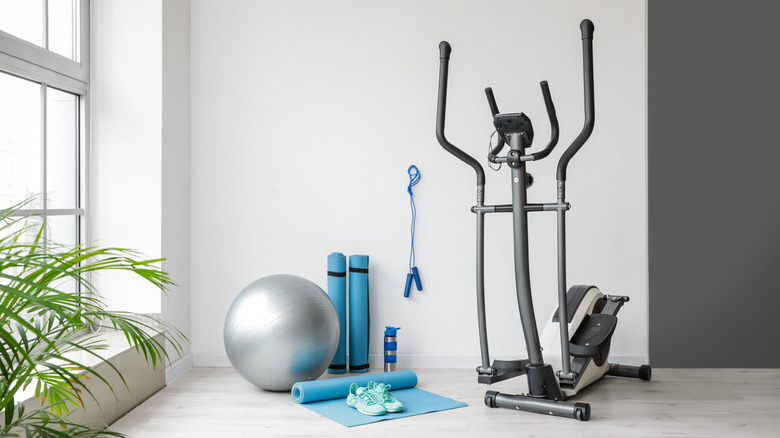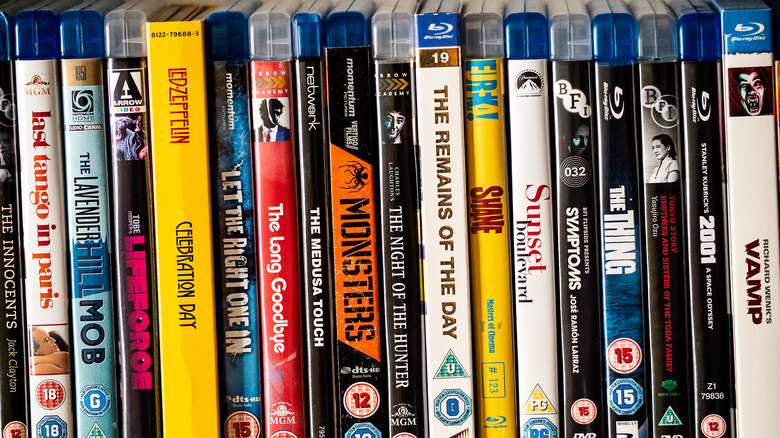Things You Should Declutter Before Moving
Moving can be an exciting time since it brings a feeling of fresh starts. But it also brings a ton of stress, headaches, and overwhelming emotions. When you decide to move, you're making a big commitment. You may not realize it at first, but the time you're going to spend preparing for it will take a lot of discipline and dedication. Still, you can choose to make the process as seamless as possible by doing a few pre-game tasks. And one of them is decluttering your home before you move.
You might think it'll be easier to declutter after you're in your new house, but according to Order & Bliss, decluttering before moving is an essential step. By doing this, you'll have less to pack, you'll have a more accurate inventory, and you'll be better prepared. Because when you take the time to sort through your things and make hard decisions about what stays and what goes, you're already putting yourself in that new start mindset. And who wants to bring old clutter into a new house? Here are some items you should definitely declutter before you move.
Prune your wardrobe
If you follow any professional organizer on social media or catch them on morning talk shows, you've probably heard them mention "transitioning." Primarily, transitioning clothes from one season to the next. One of the best times to declutter clothes is when you go from summer to fall or winter to spring. But when preparing for a move, it's time to sort through everything you own. Imagine It Done uses a six-step process for their clients when it comes to changing out clothes for the season. You can use the same method when decluttering clothes before a move.
Your aim is to empty your entire closet and separate items into categories like keep, donate, sell, recycle, or toss. Be sure to check the quality and fit of the clothes as well. And take into consideration the new climate you're moving to. Does it get cold in the winter, or does it get mildly cool? Southern California winters and New England winters are vastly different, so you may not need a ton of winter attire where you're moving to. You may need more spring and summer clothes instead. When decluttering clothes, be honest with yourself. If you haven't worn something in the last year, it's okay to part with it.
Edit your dining ware
It may seem odd to declutter dining ware before you move, but the truth is we all carry more than we need or even use. While clothes are often the major culprit in that scenario, dining ware comes in a close second. This is the time to say goodbye to those chipped plates, rusted utensils, or mismatched glasses. Even Simple Life of a Lady agrees that dining ware can cause unnecessary clutter. And since the dining room is the place to relax and enjoy a good meal, you want to ensure you're not crowding it with things you don't need.
Dining ware is also heavy since most of it is made up of glass, steel, or porcelain. The more you can eliminate, the better. What are some things you should focus on when decluttering this category? China sets for starters, but also work on decluttering serving ware you barely use. Check the quality of tablecloths and napkins, recycle bent or broken utensils, and be honest about how many travel mugs you really need. While it may be hard to make some cuts, think about how light your moving load will be when the time comes to pack it all up.
Make some hard decisions with furniture
When you decide to move, one of the first things to consider is your current furniture. Will all of it even fit in your new home? If you're downsizing, this question will become vital to your decluttering process. Why? Because some furniture, while it served you well, may need to be left behind for space reasons, and that's fine. Furniture is bulky and heavy. Some pieces must be disassembled just to remove, so you should take the time to see what pieces will come with you.
Don't be afraid to declutter items that no longer function for you. If that bookcase collects more dust than books, consider leaving it behind. If your sofa cushions are pancake thin, buy a new one when you settle in the new house. People don't often think about the expiration date of furniture. That's why it's good to know a few signs for when it's time to replace something. Mattresses, for example, last five to 10 years. When the color of your couch begins to fade, it's time to start looking for a new one. Bring only the most important and useful furniture when moving and accept that some pieces will have to stay put.
Sort through your papers
A small stack of papers doesn't weigh all that much, but a filing cabinet's worth does. That's why you should take time to declutter all of the paperwork in your home before moving. This will come in handy, especially if you need to find manuals to show you how to disassemble a piece of furniture. But it's also good to lighten your load, especially since paper can accumulate quickly. The Simplicity Habit suggests breaking paper into categories like mail, kids' paperwork, personal documents, and memorabilia. Depending on how much paper you have, you may need more and fewer categories.
Your aim is to get things in like groups so you can quickly sort through it all. If you bring your filing cabinet with you, it's a good idea to keep it empty as this will make it easier to move. You can store the paperwork you choose to keep in cardboard filing boxes for an easier transition. One way to ensure you're not carting a ton of paperwork to your new home is only to keep hard copies of important documents like taxes, insurance policies, and personal information like birth or death certificates. Manuals for furniture can be found online, and you can always take pictures of your kids' artwork for memories.
Go through your pantry items and food
You still need to eat before moving, but as the moving day gets closer, it's time to declutter your stock. This includes your pantry, fridge, freezer, and any other area you might store snacks or other food items. While some food will travel with you, it's important to determine what will travel well and what can be left behind. If you tend to collect hundreds of sauce packets from fast food joints, now is the time to declutter them. You really need to be picky about what food comes with you.
As mentioned in Decluttering Your Life, keeping an organized pantry will save you money and allow you to find food faster. It's easier to work with a clean slate rather than a full pantry, so leaving behind the food you won't use or eat is better than hauling it with you. The latter also runs the risk of spills or certain items spoiling before you arrive at your new home. That's why when you declutter your food, really consider what needs to come and what can be donated or tossed. It may feel like you're wasting food but think about the fresh start and the new, uncluttered pantry and fridge waiting for you.
Prune your book collection
Any avid reader will tell you that getting rid of books is as difficult for them as getting rid of clothing is for a fashionista. But like paper and dining ware, books are heavy and take up a lot of room in boxes if you don't pack them correctly. That's why decluttering your titles before moving is a good way to limit the amount you bring and save your back from injury. It can be challenging to declutter books, but according to Becoming Minimalist, the decision is easier than you think.
It starts with deciding to do it and remembering that books, like any entertainment, are fleeting. Once you finish it, there's no need to keep it around because those titles don't define you. This type of thinking takes some time to get used to, but once you do, you'll find it easier to declutter books you've read to make room for titles you want to read. However, you don't have to give up all your novels before moving. It's totally fine to keep your absolute favorites. But as you're sorting through them, if you come across titles that have been sitting on your shelves for years without being opened, consider leaving them behind.
Weigh your home decor
Another category that seems to accumulate before you even know it is home decor. This includes holiday decorations, centerpieces, artwork, and general decor that you strategically place in your home to give it a touch of personality. There's nothing wrong with home decor. It can spruce up your home, but too much can overwhelm your new house. It's important to remember that you haven't decorated your new home yet, so the pieces you have may not fit or even work in the space you have. That's why decluttering all your home decor before moving is a great idea.
It's easier to decide what to keep and leave behind by asking a series of simple questions. Lock & Key Home Organization proposes you look at each individual piece and ask yourself: Do you like it? Do you use it? Why don't you want to toss it? How should you get rid of it? If you're hanging on to gifted decor pieces you don't love, it's fine to declutter them. If you have six of the same Christmas ornaments, keep two. Home decor ultimately comes down to portion control. Once you decorate your new home for the first time, you'll be able to see what you can replenish.
Get honest about your kitchen appliances and tools
We already mentioned dining ware, but now it's time to talk about another major category that doesn't get decluttered enough. Kitchen appliances and tools don't seem like a hassle to move, but their odd shapes and sometimes bulky exteriors can make it quite difficult. And if you tend to collect gadgets for every single thing — like an avocado peeler or lemon squeezer that you use once a year — it's time to rethink their value in your life.
Project Neat calls this type of clutter "kitchen overflow." Essentially, it's when you have so much kitchen stuff you can't seem to get it all organized. If you never took that pasta maker out of its box, consider donating or selling it. Ask yourself if you'll actually use it in the new house. If the answer is no, it's fine to declutter it. Packaging up this room will be a breeze when you eliminate a ton of kitchen excess. It'll also give you more space to organize what you keep in the new home.
Get picky about towels and linens
It's normal to want to bring as much of your current stuff with you as possible when moving. But sometimes you must face the fact that some stuff has seen better days and you should part with it. Items that fall into this scenario are towels and linens. You grow so attached to your towels and linens that even when they fray and tear, you can't seem to get rid of them. However, when you move, they run a higher risk of getting more tattered during the process. That's why decluttering them ahead of time will save you a lot of hassle.
It's important to note that keeping towels and linens too long can cause some problems, according to Standard Textile. For starters, the longer you keep worn-out linen, the more bacteria grows and sticks to it. Towels, too. It doesn't matter how often you wash them – NHS reports that germs can still spread even in the washing process. That's why replacing them is important once you begin to see signs of wear. If you start going through your towels and discover a ton that can be recycled, consider using them for moving blankets or stuffing material. This way, they get one more use before you get rid of them when you arrive at your new home. But make sure you replace them; otherwise, you'll be tempted to keep them around.
Trim down toys
It seems like the only things you'll declutter before a move are items for adults. But you can get your kids involved in the process by having them declutter their toys ahead of moving day. Will you be met with resistance? Of course, but if you explain the importance of eliminating excess, they will come to understand that more room means new toys in the future. And believe it or not, kids like being involved in decision-making scenarios like this. It hones their skills and makes them feel like they're doing important work.
There are a few ways you can declutter toys with the help of your kids. Lock & Key Home Organization recommends creating a set of rules before starting. Make it clear how many toys you expect them to declutter. If you just tell them to get rid of stuff, they won't have that much. But if you give them a strict number, you're guaranteed to get results. Another tip is to lead by example. If they see you decluttering clothes, dining ware, and more, they'll be more inclined to participate in the process because they see that if you can do it, so can they.
Edit your bathroom products
Moving is all about strategic planning and preparation. Many professional organizers are adding moving services into their business because they see people's need for packing and unpacking. One thing you want to avoid when getting ready to pack is having a ton of little stuff that gets thrown haphazardly into a box. And one room that has a lot of this stuff is the bathroom. Between hair products, makeup, hygiene items, and more, the bathroom is a room you should definitely declutter before moving.
According to The Elbow Room, bathrooms tend to be the messiest room because of all the products used in them. The last thing you want are those bottles spilling out in a box and getting everywhere. Some areas to focus on when decluttering the bathroom include your medicine cabinet. Toss any expired medication and list what you want to replenish when you arrive at your new home. Make sure only to take daily essentials like toothbrushes, toothpaste, face wash, soap, and shampoo. If you can, use up what you have and plan to buy a new one when you get to your new house. If you must bring a ton of products with you during the move, ensure they are packed in a way that will avoid spills.
Donate sporting and exercise equipment
We mentioned earlier how furniture could be bulky and difficult to move. Another culprit that tends to run large and heavy is sporting equipment or exercise machines. When was the last time you got on the treadmill? Do you actually play tennis anymore, or is your racket for display only? Are your kids interested in the soccer net you built outside? Home Storage Solutions writes that it's all about taking into account what you use and what you don't use when it comes to this category.
Getting rid of sporting and exercise equipment can be tough since they tend to run on the expensive side. But what is worth more to you: Keeping it because it's costly, or saving room in your new home for things you'll use? The choice is obvious, but it may take some time to get there. When decluttering these items, really focus on what your interests are. If you're really into yoga, keep that mat and blocks but leave the pilates machine. The same goes for your kids. If they're into marital arts, hang on to what they need, and know you can always replace a baseball bat when they want to pick it up again.
Toss outdated media
We've seen many technological advancements over the last few years. Streaming services have almost replaced cable television. You can instantly watch nearly any movie or TV show. Spotify and Apple Music have replaced CDs, and online courses have swept through the internet. With all this new technology at our fingertips, the time has come to say goodbye to your stack of CDs and DVDs. According to Bella Organizing, it's normal to find piles of outdated media buried in your home somewhere. And getting rid of them can be difficult, especially those movies or shows you can't find on any streaming site.
Like books, it's totally fine to keep your absolute favorites. If you do, make sure you have some kind of device you can play them on. It won't matter if you keep a few DVDs but don't have a player for them. Another option is transferring everything into a digital format. Libraries also have tons of films and CDs for your viewing and listening pleasure, so don't rule them out. While you may not be ready to go full-time streaming yet, it's good practice to start eliminating outdated media that you haven't used in years. As with any decluttering project, you need to take baby steps. But the more you declutter, the better you'll know what serves you going forward.
